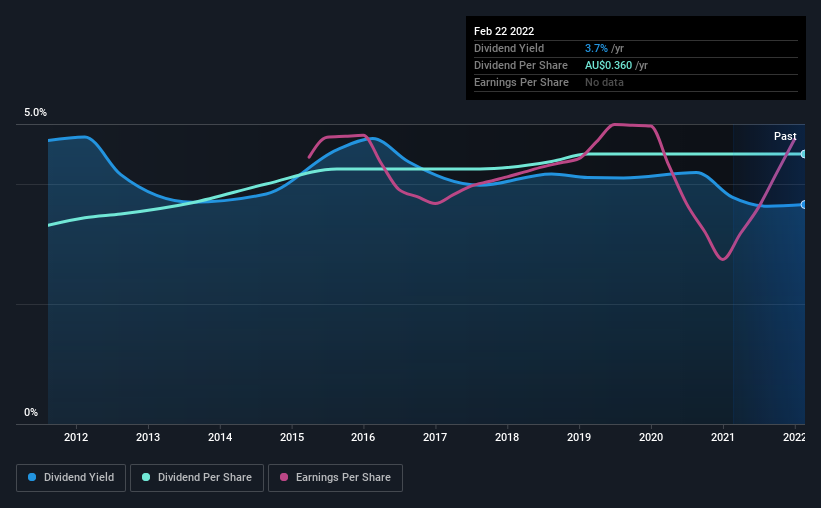Australian United Investment (ASX:AUI) Has Affirmed Its Dividend Of AU$0.17
The board of Australian United Investment Company Limited (ASX:AUI) has announced that it will pay a dividend of AU$0.17 per share on the 18th of March. This payment means that the dividend yield will be 3.7%, which is around the industry average.
Check out our latest analysis for Australian United Investment
Australian United Investment's Dividend Is Well Covered By Earnings
We aren't too impressed by dividend yields unless they can be sustained over time. Prior to this announcement, Australian United Investment's dividend was making up a very large proportion of earnings and perhaps more concerning was that it was 96% of cash flows. Paying out such a high proportion of cash flows can expose the business to needing to cut the dividend if the business runs into some challenges.
Over the next year, EPS could expand by 5.2% if the company continues along the path it has been on recently. If the dividend continues growing along recent trends, we estimate the payout ratio could reach 81%, which is on the higher side, but certainly still feasible.
Australian United Investment Has A Solid Track Record
Even over a long history of paying dividends, the company's distributions have been remarkably stable. Since 2012, the first annual payment was AU$0.27, compared to the most recent full-year payment of AU$0.36. This works out to be a compound annual growth rate (CAGR) of approximately 3.1% a year over that time. Although we can't deny that the dividend has been remarkably stable in the past, the growth has been pretty muted.
The Dividend Has Growth Potential
Investors could be attracted to the stock based on the quality of its payment history. It's encouraging to see Australian United Investment has been growing its earnings per share at 5.2% a year over the past five years. Recently, the company has been able to grow earnings at a decent rate, but with the payout ratio on the higher end we don't think the dividend has many prospects for growth.
Australian United Investment's Dividend Doesn't Look Sustainable
Overall, it's nice to see a consistent dividend payment, but we think that longer term, the current level of payment might be unsustainable. In the past the payments have been stable, but we think the company is paying out too much for this to continue for the long term. This company is not in the top tier of income providing stocks.
It's important to note that companies having a consistent dividend policy will generate greater investor confidence than those having an erratic one. However, there are other things to consider for investors when analysing stock performance. As an example, we've identified 1 warning sign for Australian United Investment that you should be aware of before investing. If you are a dividend investor, you might also want to look at our curated list of high yield dividend stocks.
Have feedback on this article? Concerned about the content? Get in touch with us directly. Alternatively, email editorial-team (at) simplywallst.com.
This article by Simply Wall St is general in nature. We provide commentary based on historical data and analyst forecasts only using an unbiased methodology and our articles are not intended to be financial advice. It does not constitute a recommendation to buy or sell any stock, and does not take account of your objectives, or your financial situation. We aim to bring you long-term focused analysis driven by fundamental data. Note that our analysis may not factor in the latest price-sensitive company announcements or qualitative material. Simply Wall St has no position in any stocks mentioned.

 Yahoo Finance
Yahoo Finance 
